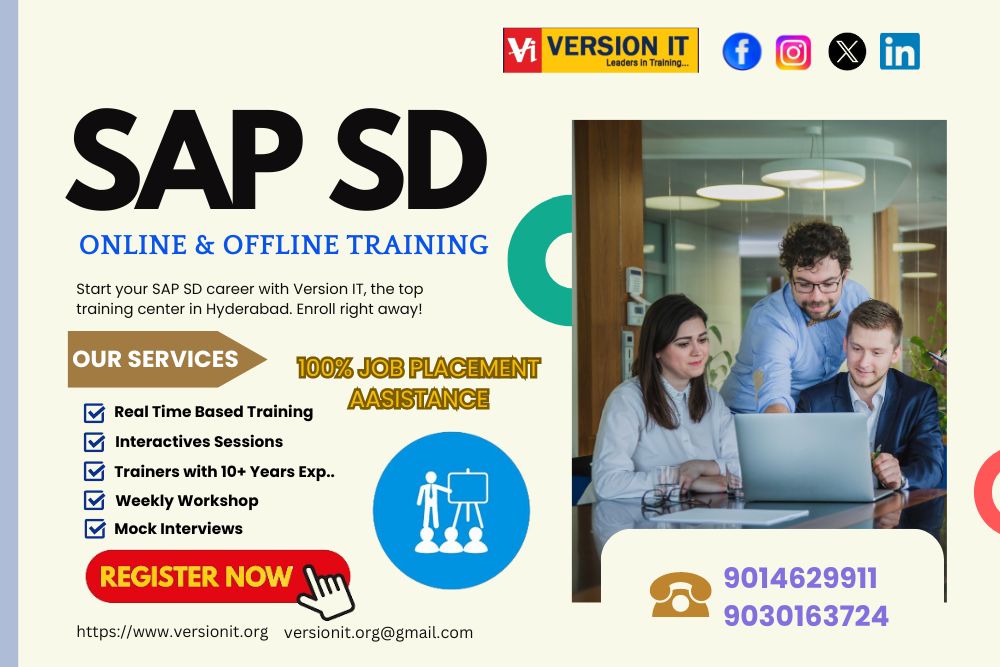How is material management associated with SAP SD?
Material management (MM) and sales and distribution (SD) are two integral modules within the SAP ERP system that work in tandem to streamline a company’s logistics, sales, and inventory processes. The association between SAP MM and SAP SD is crucial for ensuring the smooth flow of goods and information within an organization, from procurement to sales fulfilment. In this detailed exploration, we’ll delve into how material management is associated with SAP SD, the interdependencies between these modules, and why pursuing SAP SD Training in Hyderabad can be a vital step for those aiming to build a successful career in supply chain and sales management.
Understanding SAP MM and SAP SD Modules
- SAP MM (Material Management): SAP MM is a module that deals with the procurement and inventory management aspects of a business. It includes everything, from obtaining raw materials to storing and transporting commodities inside an organization. SAP MM ensures that materials are available when needed, at the right place, in the right quantity, and at the lowest possible cost. Purchasing, inventory control, material value, and invoice verification are important SAP MM procedures.
- SAP SD (Sales and Distribution): SAP SD is a module that manages the sales and distribution activities of a company. It involves processes related to order processing, shipping, billing, and customer relationship management. SAP SD ensures that products are delivered to customers in a timely manner and that the sales transactions are recorded accurately. This module also integrates with other SAP modules, such as SAP MM and SAP FICO, to provide a comprehensive solution for managing sales, logistics, and financials.
The Integration Between SAP MM and SAP SD
- Procurement and Sales Order Processing: The most fundamental link between SAP MM and SAP SD occurs during the procurement and sales order processing stages. When a sales order is created in SAP SD, it may trigger the need for procurement of materials if the inventory is insufficient to fulfil the order. This process is managed by SAP MM, which handles the procurement activities, ensuring that the necessary materials are ordered and delivered in time to meet the sales order requirements.
- Availability Check (ATP – Available to Promise): One of the critical integration points between SAP MM and SAP SD is the Availability Check (ATP). ATP is a process that determines whether the required materials are available to meet customer orders. If the material is not available, the system may trigger a purchase requisition through SAP MM to procure the necessary materials. This ensures that the company can meet customer demand without delay.
- Stock Transfer and Intercompany Sales: SAP MM and SAP SD work closely together in managing stock transfers and intercompany sales. While intercompany sales include transactions between various legal entities within the same organization, stock transfers entail the movement of products between different locations within the same company. In both cases, SAP MM handles the inventory management and movement of goods, while SAP SD manages the sales order processing, billing, and delivery.
- Third-Party Order Processing: A business sells goods to clients through third-party order processing, but it does not keep inventory. Rather, the goods are acquired by the business from an outside supplier who delivers them straight to the client. This process requires close coordination between SAP MM and SAP SD. SAP SD handles the sales order and customer billing, while SAP MM manages the procurement of the goods from the third-party vendor.
- Shipping and Logistics: The integration between SAP MM and SAP SD is also evident in shipping and logistics activities. This coordination is essential for managing outbound logistics and ensuring timely delivery of goods to customers. SAP MM manages the inventory and movement of goods within the warehouse, while SAP SD oversees the delivery process and customer communication.
- Billing and Invoice Verification: Once the goods are delivered to the customer, SAP SD generates the billing document. This document is then passed on to SAP MM for invoice verification, especially in scenarios involving third-party procurement or intercompany transactions. Invoice verification in SAP MM ensures that the company accurately records the cost of goods sold, matches purchase orders with vendor invoices, and updates the financial records accordingly. This integration is crucial for maintaining accurate financial statements and ensuring compliance with accounting standards.
Benefits of the Integration Between SAP MM and SAP SD
- Streamlined Operations: The seamless integration between SAP MM and SAP SD leads to streamlined operations across the supply chain and sales processes. It ensures that all departments are working with accurate and up-to-date information, reducing the risk of errors and inefficiencies. This leads to faster order processing, improved customer satisfaction, and optimized inventory management.
- Enhanced Visibility and Control: Integration between SAP MM and SAP SD provides enhanced visibility and control over the entire supply chain. Companies can track the movement of goods from procurement to delivery, monitor inventory levels in real time, and manage sales orders efficiently. This visibility enables better decision-making, as managers have access to accurate data on inventory levels, sales performance, and procurement activities.
- Cost Savings: The integration of SAP MM and SAP SD can lead to significant cost savings for businesses. By optimizing inventory levels, reducing stockouts, and minimizing excess inventory, companies can reduce carrying costs and improve cash flow. Additionally, the automation of procurement and sales processes reduces manual effort, leading to lower operational costs.
- Improved Customer Service: The integration between SAP MM and SAP SD ensures that customer orders are fulfilled accurately and on time. This leads to higher customer satisfaction and loyalty, as customers receive their orders when expected and with the correct products. The availability check function, for example, helps prevent stockouts and delays, ensuring that customers can rely on the company to meet their needs.
The Importance of SAP SD Training in Hyderabad
- Comprehensive Understanding of Sales and Distribution: SAP SD Training in Hyderabad provides a comprehensive understanding of the sales and distribution processes within an organization. The training covers essential topics such as sales order processing, pricing, billing, shipping, and customer relationship management. This knowledge is crucial for anyone looking to build a career in sales and distribution management, as it equips you with the skills needed to manage sales operations efficiently.
- Hands-On Experience with Real-World Scenarios: The best SAP SD training programs in Hyderabad, such as those offered by institutes like Version IT, emphasize hands-on experience with real-world scenarios. This practical approach allows you to apply what you learn in simulated business environments, giving you the confidence to handle complex sales and distribution processes in your career.
- Integration with Other SAP Modules: During SAP SD training, you will also learn about the integration between SAP SD and other SAP modules, particularly SAP MM. Understanding how these modules work together is crucial for managing end-to-end business processes. The training will teach you how to coordinate with procurement, inventory management, and financial accounting teams to ensure smooth operations and accurate reporting.
- Certification and Career Advancement: Earning an SAP SD certification from a reputable training institute in Hyderabad adds significant value to your resume. This certification can open doors to a wide range of career opportunities, from SAP SD Consultant to Sales Manager, and help you advance in your career.
- Placement Assistance and Networking: Version IT training institutes in Hyderabad offer placement assistance to their students. This includes resume building, interview preparation, and connecting students with potential employers. Given the high demand for SAP SD professionals, those who complete their training and earn certification often find employment quickly. Furthermore, training in Hyderabad gives you lots of networking opportunities to meet peers and industry people who can support you in your career.
Conclusion
The association between material management (SAP MM) and sales and distribution (SAP SD) is a fundamental aspect of SAP ERP systems. These modules work together to ensure efficient procurement, inventory management, and sales order processing, all of which are crucial for the smooth operation of a business. Pursuing SAP SD Course in Hyderabad is an excellent choice for those looking to build a career in sales and distribution management. The training provides a comprehensive understanding of the SAP SD module, hands-on experience with real-world scenarios, and knowledge of the integration with SAP MM.




